Exploring the Future of Architecture
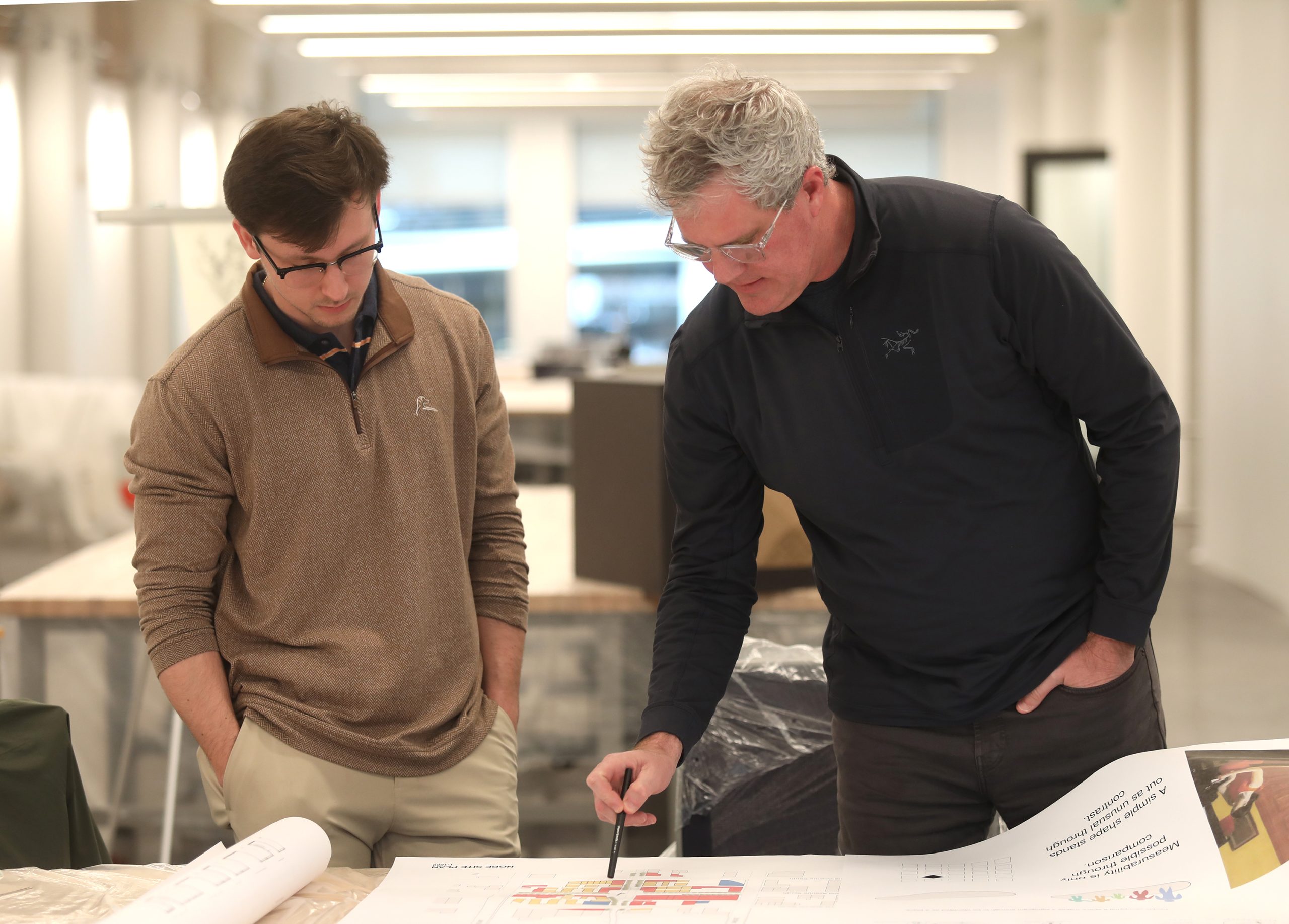
A Look at the Urban Studio Class of 2024’s
Student Thesis Presentations
As we celebrate the culmination of another academic year at Auburn’s College of Architecture, Design and Construction, our students presented their thesis projects—a defining moment in their architectural education.
These comprehensive projects serve as the capstone of students’ academic journeys. Theses involve the development of detailed design and research work, focusing on a specific area of interest within a larger research project. The thesis is not merely an exercise in theoretical research or practical design but a fusion of both, where students are expected to apply critical thinking, creative problem-solving and rigorous academic research. The thesis is a student’s opportunity to explore complex issues ranging from sustainable urban planning to innovative construction techniques and to propose forward-thinking solutions.
The Importance of the Thesis in Architectural Education
The process of developing a thesis is crucial in the discipline of architecture for several reasons. The thesis synthesizes all the skills and knowledge that students have accumulated throughout their education. It challenges them to apply their learning in a real-world context, bridging the gap between academic studies and professional practice.
Through the thesis process, students learn to manage long-term projects, hone their design and presentation skills, and prepare for professional critiques. These are all critical skills for their future careers in architecture, where projects often require extensive research, planning and client interaction.
The students present their thesis projects to a jury of local professionals. The Spring 2024 jury consisted of seven members ranging from architects, urban planners, educators and landscape architects. The jury members are given rubrics to rate the presentations as well as space for comments.
Thesis presentations are expected to be a culmination of their architectural education and reflect their academic development. The students need to be prepared to explain their research and designs, take in the accompanying criticism and compliments and reflect on their accomplishments. Presentations will be an important part of their future professional lives, and the ability to succinctly offer their ideas and opinions will be an asset as their careers grow.
Benefits of Preparing and Presenting a Thesis
The benefits of preparing and presenting a thesis are multifaceted. By focusing on a specific topic, students can develop deep expertise in a particular area of architecture, making them more attractive to future employers or setting the stage for further academic research. At Urban Studio, students tackle real-world problems, often addressing complex issues that lack straightforward solutions. This develops advanced problem-solving skills, which are invaluable in any professional setting. Additionally, a well-executed thesis project enhances a student’s portfolio, showcasing their ability to carry out extensive research and deliver polished, professional-quality work.
Each of the 2024 fifth-year students began their thesis work with a more holistic group project, the Birmingham Parking Study, and then chose aspects of this study to focus their research. The students were also asked to reflect on their thesis research and answer two questions:
- What surprised you most about your thesis research?
- How do you think the skills you used for your thesis projects will benefit you as you begin your careers?
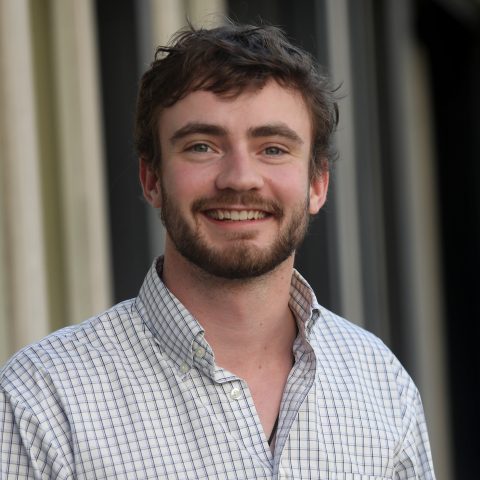
Adrian Steward
Steward’s thesis centered around parking decks, from their usefulness and potential to what could happen to them in the future. He discussed how to make parking decks more inviting, the various environmental problems caused by parking decks, and how in the future cities can incorporate parking decks as wayfinding or artistic projects as well as how decks have the potential to eventually be converted to affordable housing.
“I was surprised about how there appears to be a lack of projects that are built with this idea of converting parking decks into residential structures. I hope that the lack of precedents is because this topic is a new way of thinking about the parking problem in the United States. Hopefully, it is not a hint that this kind of project is not feasible.”
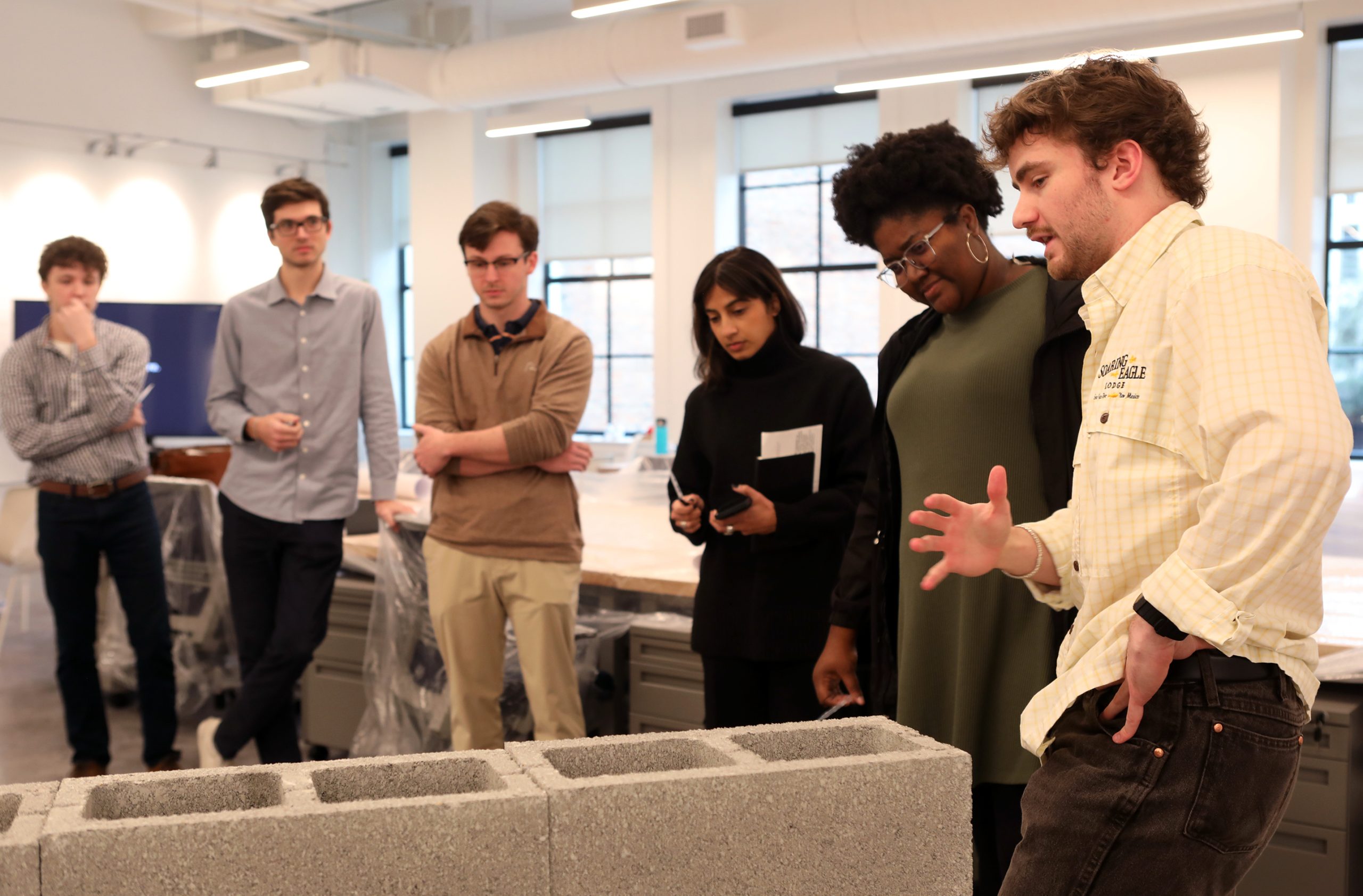
“The skill that my thesis project has taught me is how to research and look at an idea through the lens of the ‘real world’. A lens that knows the projects we have done in the past has had a leniency to them that allowed for us, as students, to lean towards the imaginative. But with our thesis we must be open to the fact that there is a reality to architecture. That sometimes or even most of the times the practical takes hierarchy over the imaginative.”
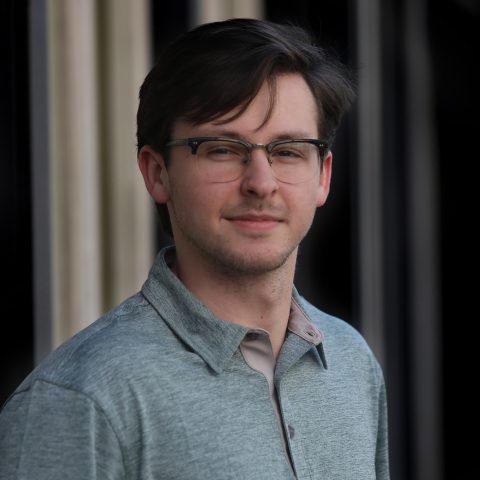
Jimmy Ramsey
For Ramsey’s research, he explored the fabric of the city through historical lenses of the use of plazas and corridors. Through this he looked at how you can create natural wayfinding and potentially use modular constructure to draw city dwellers into areas designed for pedestrian and community activity.
“I sought out looking for a practical real-world topic to research and settled on Modular construction. I was surprised by how this thesis led me to research much more general ideas about Architecture. In the end, the real question my Thesis attempted to answer is what creates a spirit of place.”
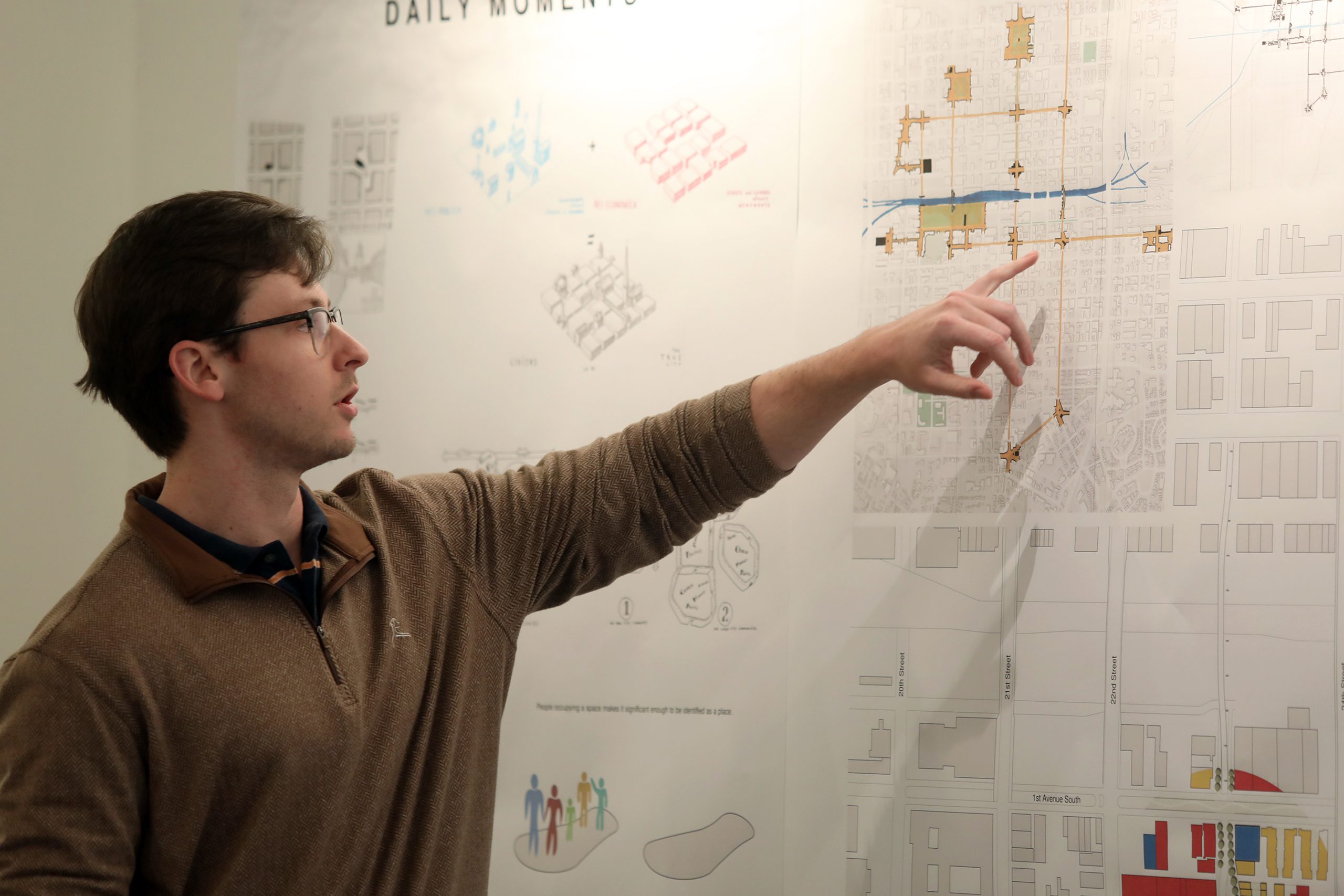
“I think the Thesis project is a great opportunity to take time to learn about your personal convictions about what Architecture should be before being constrained by the financial pressures of professional practice. I think it also has helped to improve my research skills and my presentation skills.”

Camille Lewellyn
Lewellyn focused on the environmental effects of impervious surface lots and both the economic and health impacts these lots have on cities and their inhabitants. She focuses on how we can use architecture and planning to regenerate and benefit the environment.
“I think what surprised me most about my thesis were the actual numbers that resulted from my research. It’s crazy how much damage is being done from all the brownfield sites and empty parking lots.”
“I think now I’m well versed in environmental issues and architectural solutions, which, of course, will always be beneficial to know when designing something.”
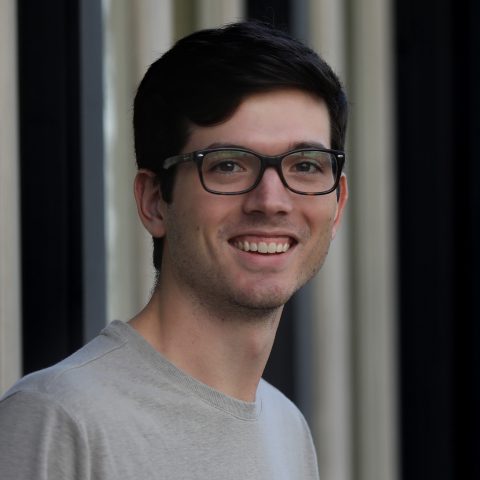
Jack McMullen
For his thesis, McMullen looked at the current master plan for the city and the goal to attract more families to the downtown core. As he looked at family housing through the lens of the master plan goals, it became apparent that with parking, affordability and walkability challenges, the city would have to figure out how to create a place families would be comfortable to raise children in.
“The thing that surprised me the most about my thesis research was the lack of families in downtown Birmingham. While there are many young professionals and empty-nesters, families leave the city to raise their kids.”
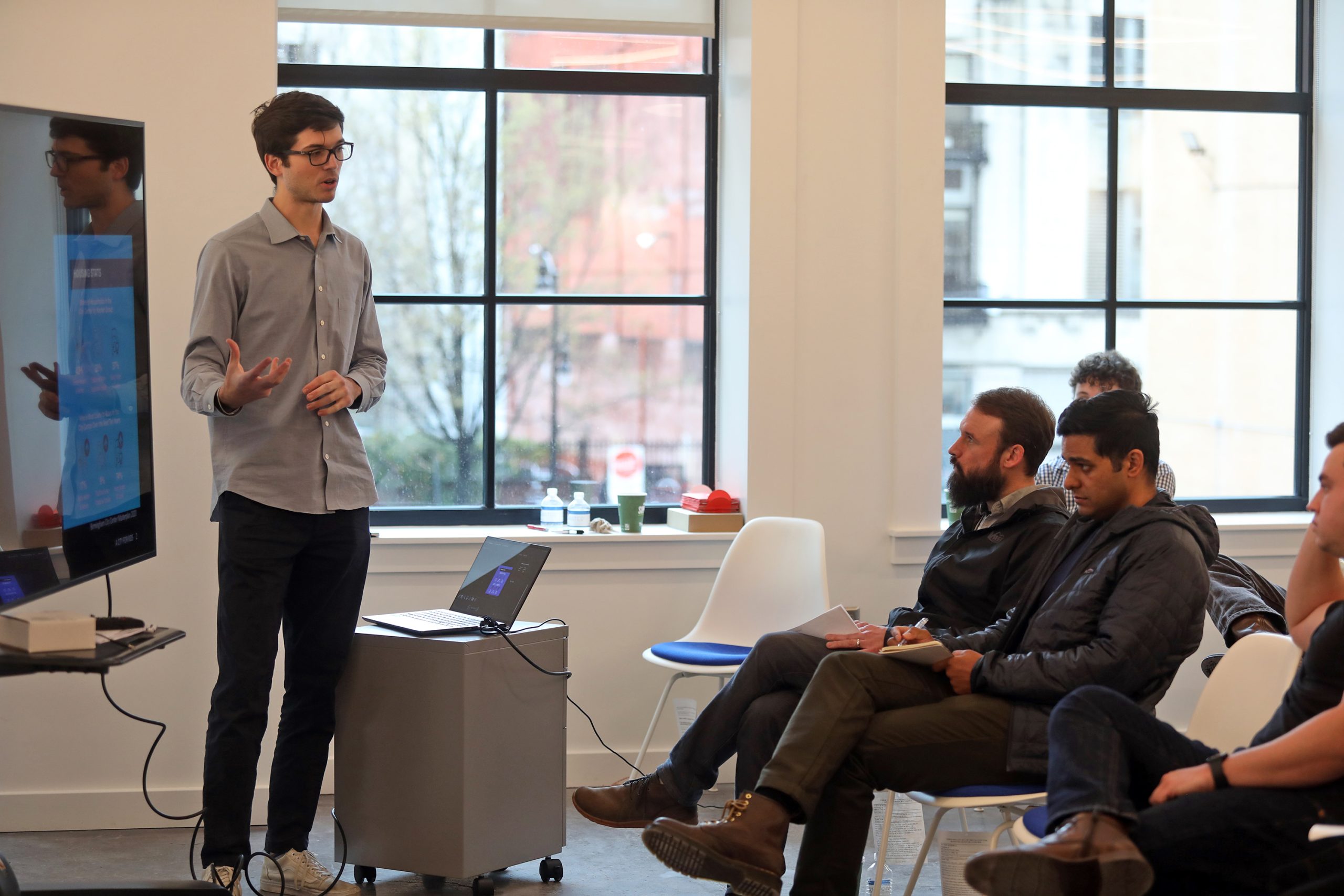
“Working on my thesis project taught me how to approach a problem that I have no idea how to solve. Start by researching to build a base of knowledge on the topic before attempting to provide a solution. Then based on the new knowledge you can begin working towards a solution and refining your research topics.”
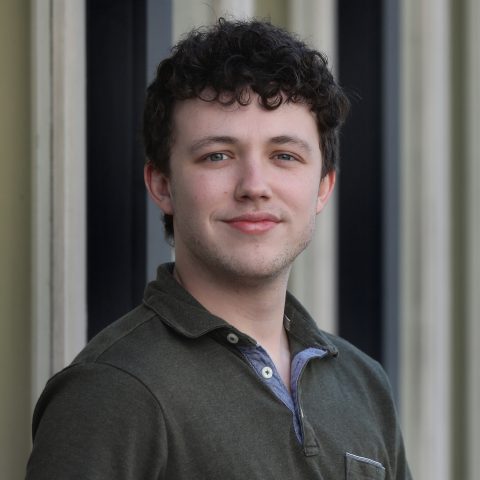
Jeremy Daniel
Daniel’s research led him to take a closer look at the infill of empty lots, specifically in the historic Smithfield neighborhood of Birmingham. He discovered one of the biggest challenges of creating affordable and effective infill housing in neighborhoods with small lot lines is city ordinances and requirements for setbacks and parking.
“The thing that surprised me most was probably the challenge of really understanding the restrictions of a building footprint that can be at most 14′ wide, while trying to ensure it would be ADA accessible on the ground floor as well as a comfortable living space regardless. Just because it needs to be small to fit on the 20’ wide site does not mean it can’t be a space worth having pride in.”
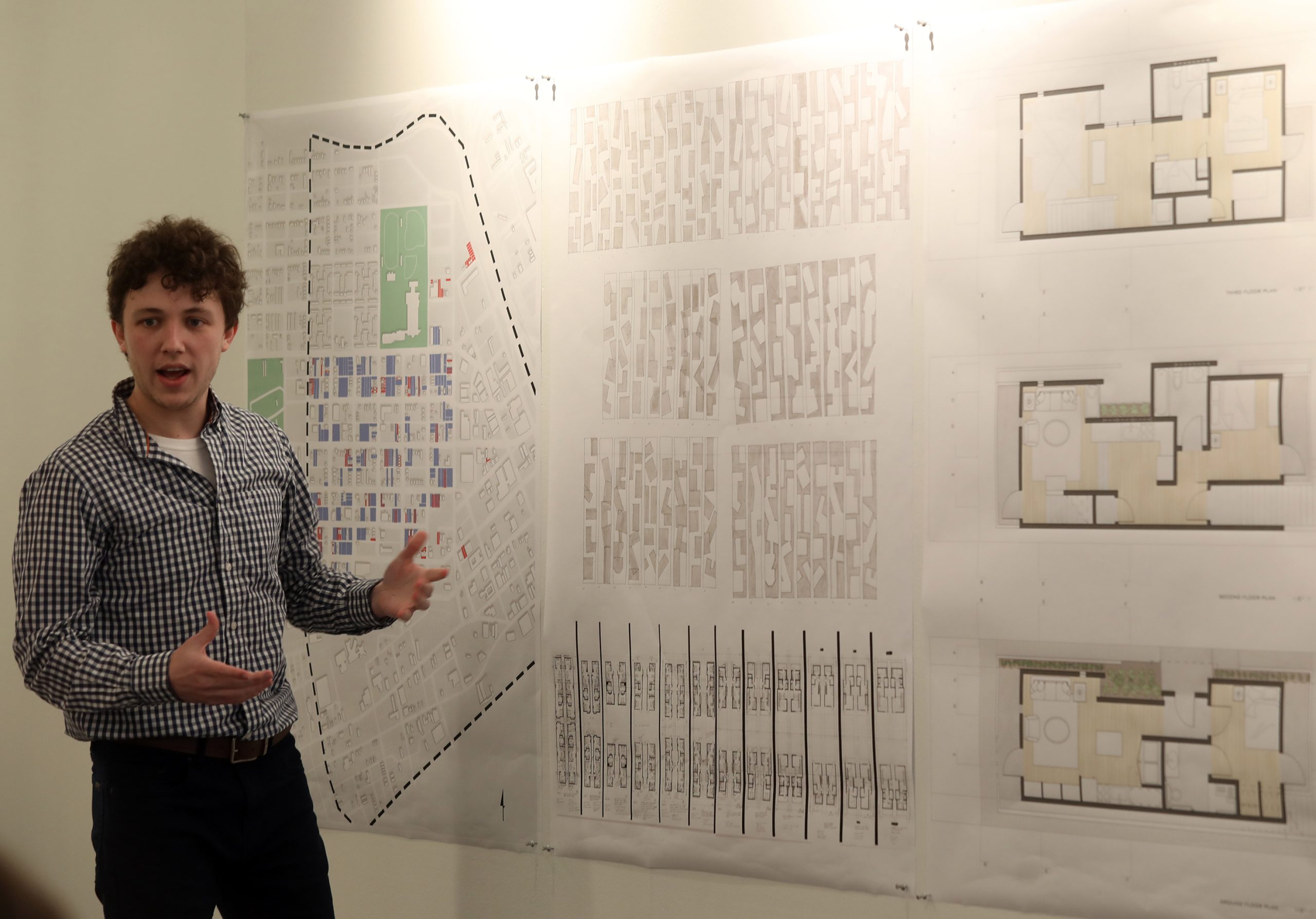
“The skills I learned from my research of this project will directly benefit me as I begin my career because there is a lot I had to study about residential architecture, and as I graduate, I will be starting my career with a residential architecture firm.”
The Jury
While the jury review process can be daunting for students, it is a valuable experience as they go out in the world as newly minted intern architects.
Because of this, serving on the thesis is a commitment jurors take seriously. This year’s jury included a combination of faculty and working professionals. For some, this is a way alumni can give back to Auburn University and Urban Studio; for others, it’s an opportunity to contribute to the future of the profession.
Urban Studio students’ work isn’t done in a vacuum. They study the real problems facing all levels of urban areas in Alabama and are often especially focused on Birmingham. This is not lost on the jury. Jurors are given criteria to ensure students meet and understand specific academic and industry requirements. The thesis ideas can be picked up by local officials and designers to enhance the urban experience for residents.
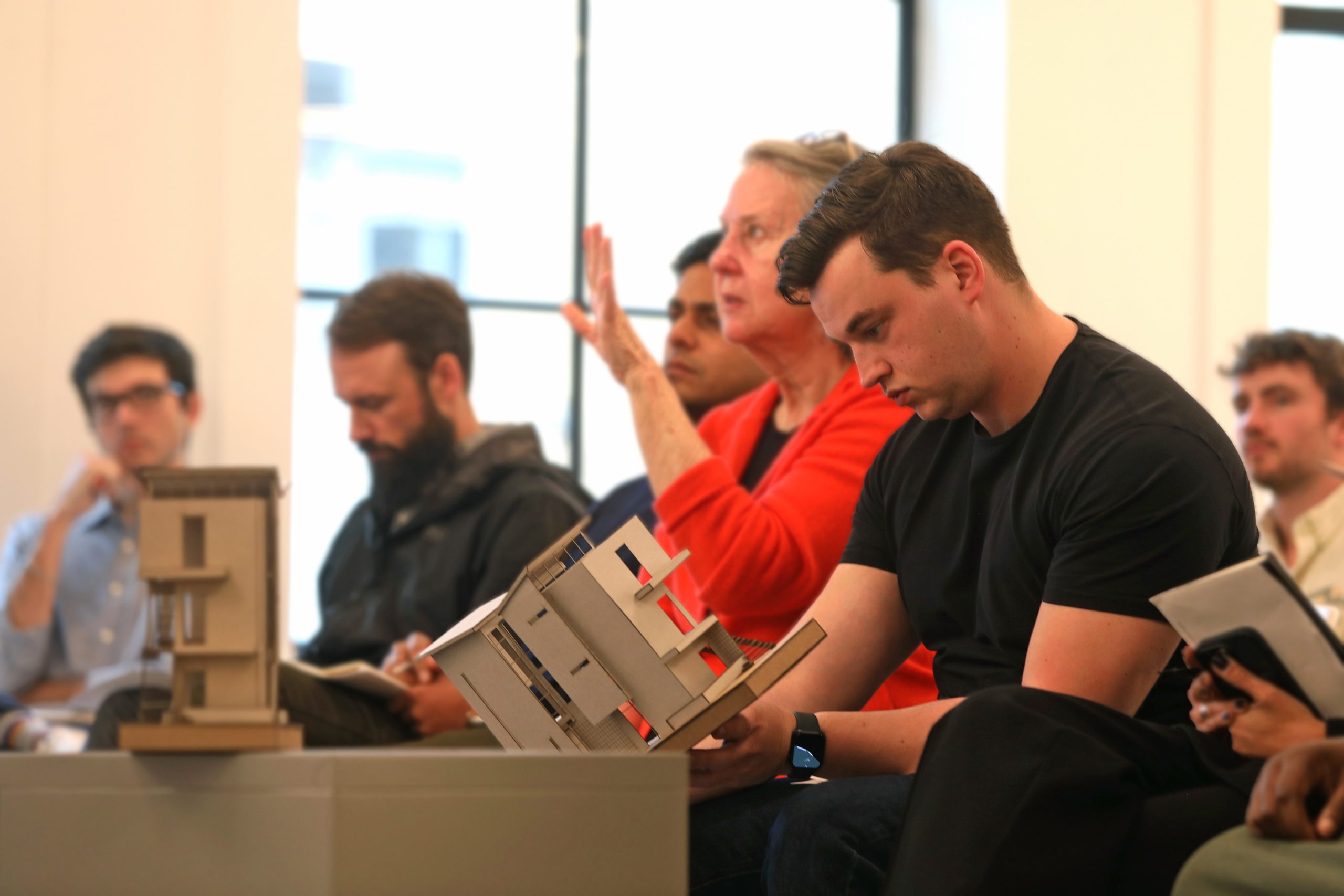
It’s also an exciting process for the jurors. They get to see and hear projects, often quite different from the work they do on a daily basis. Jurors give the students real-world feedback and advice that can take them to the next stage of their careers and beyond. The process can also trigger memories for the Urban Studio alumni. As Matt Leavell, Leavell Design Consulting, recalled, “I still remember some of the comments I received during my design reviews. It’s hard to think of a better return on investment when I’m considering ways to contribute to the betterment of design in Alabama.”
Students also get exposed to representatives from local architecture firms, so the thesis presentations can be a first or even second step towards getting hired at their first jobs. “As a professional and potential employer, I want to see how the students present themselves and their projects,” explained Adrienne Retief, Pfeiffer Torode Architecture.
Advice for future students
This year’s jury was also asked to give future students some advice for their thesis projects and presentations:
“Realize that, despite your intimate familiarity with your project, you are often presenting to people not familiar with it but highly interested in it, and crafting your (time-limited) presentation for this audience is of great importance — in a way that is typically very different from prior presentations from earlier years made to faculty members.”
– John Pittari, Auburn University
“Presentations need to be designed with the same level of care and energy placed into buildings and places. Urban Design has a complex audience with a variety of perspectives and backgrounds. A significant part of your job is to earn their trust through clear communication. These projects are opportunities for you to begin building that skill set. Invite people from outside the studio to review your work. Recognize that their ability to understand your project is as important as the quality of your design.”
– Matt Leavell ‘01, Leavell Design Consulting
“The jurors are responding to the work the students pin up and the words they use to describe their process and design solutions. The comments are not to celebrate but to push the design solutions and test them and create a dialogue that allows the students additional opportunities to improve their work and process.”
– Ben Wieseman ‘12, Place Associates
“If it’s a thesis, take it seriously. Do the hard work to ensure you are investigating an important idea. Stick to your guns when it comes to your ideas. Use your studio critiques wisely. They are not there to give you ideas. They are there to be a sounding board. You don’t have to please the critics, but you must utilize them correctly as fellow intellectuals to share thoughts, ideas and dialogue about your insights. In the end, the work is yours, not theirs. Stand by it and deliver a serious investigation and solution rooted in architectural ideas. And if it’s not a thesis, the same applies. College is time-consuming; gain the most intelligence you can while you are there. It’s possibly the last opportunity you will have to investigate freely. Lastly, use your time at school to develop long-lasting design and work habits.”
– Kyle D’Agostino, Poole & Co.
“Take them seriously—it will follow you for a long time.”
– Adrienne Retief ‘84, Pfeffer Torode Architecture
Want to learn more about the Urban Studio experience?
See more in:
Student Experience,
Urban Studio
Related people:
Alex Krumdieck,
Jennifer Cloe,
John Pittari, Jr.,
Ben Wieseman